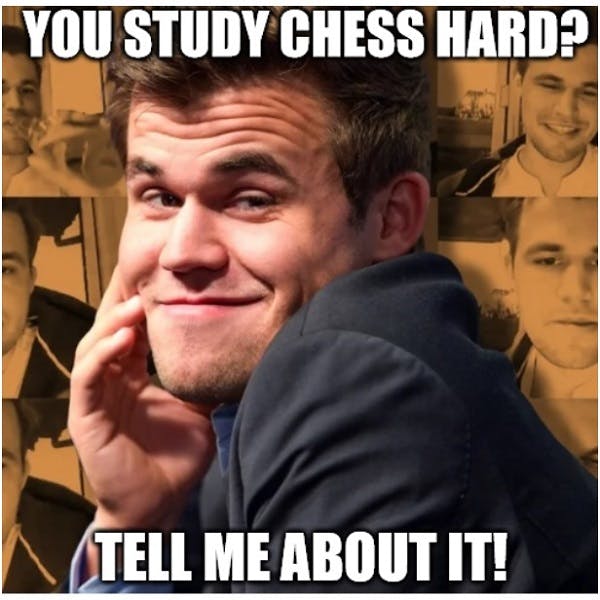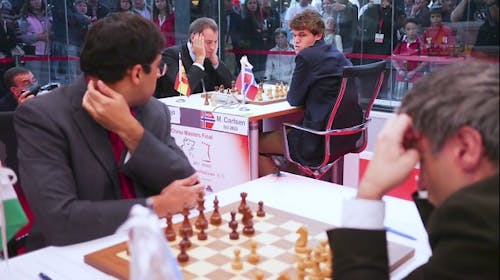Are you sure you want to delete your account?
(This will permanently delete all of your data - purchases, game scores, ratings, etc)
Change your username
Your current username is: guest
Change your account email address
Your current account email is:
Redeem your Fampay code here!
Use your Fampay code to get access to the Play Magnus Plus Membership!

I Study Chess Very Hard. Where is My Progress?
You have probably heard about the popular 10,000 hours rule that Malcolm Gladwell popularized. It states that it takes 10,000 hours of intensive practice to achieve mastery of complex skills and materials, such as playing the violin or becoming a proficient IT developer. As a result, many chess fans tend to oversimplify things, leaving all the other factors out of the equation. That is, they believe that their mastery in chess, typically measured in online or over-the-board ratings, should linearly increase over time as long as they put in enough effort. If, after doing some studies, they don’t see immediate gratification, such as a rating boost, they start lamenting.
While this situation is quite typical of chess players, the answer to why this might happen is highly individual. Let’s consider the most typical cases.
First of all, there is the explanation that negative-minded and unsuccessful coaches like to offer. While bad doctors tell their elderly patients not to expect much from the treatment since the latter are “too old to be fully healthy”, some chess coaches follow the same pattern and tell their students that the latter have probably hit their ceiling. Most of the time, this is false, and in those cases when it is true, like a top player losing his strength due to an illness or aging, it is usually self-obvious and requires no expert analysis.
The second case is more complicated. Sometimes in both physical training and chess, one gets stuck on a plateau for a certain period. Progress in chess is not linear. It usually takes at least a year of dedicated studies to notice an increase in tournament performances. Don’t expect to gain points at a steady rate. As you build up your new chess habits, it is quite normal to fluctuate at more or less the same level for some time or even sink a bit only to soar up later.
Thirdly, sometimes one’s study plan is not efficient enough. If, after one or two years of hard work, there is no progress at all, the chances are that you are doing it wrong. For example, maybe you are studying too much and hardly playing chess. Or, the reverse scenario, all you do is play blitz without even analyzing your games and thus learn close to nothing. Or maybe you spend all your time cramming up openings even though it is by far not the best way to master chess, particularly for untitled players. The list could go on and on. In this situation, it is advisable to reconsider your training routine and to consult an experienced coach for the sake of getting some advice.
Fourthly, make sure you are not deluding yourself when you say that you “study chess hard.” How hard is hard? Even if you believe in the controversial 10,000 hours rule, it is better to keep a training diary and track how much time you allocate to studies. Otherwise, people often end up training inconsistently and overestimating the number of hours they put in. More on that later.
Fifthly, I will never cease to repeat that chess requires comprehensive training. A common mistake is to study too hard or to neglect physical/psychological training for the sake of working on the game exclusively all day long. If you gain proficiency in one component but degrade in the others, your overall result is not likely to improve. For instance, if you become better at chess, but your physical shape becomes so bad that you can’t focus well enough during the game, your results may suffer. Or, no matter how fit and good at the game you are, it is hard to play well when your mind is obsessed with some external issues: problems at work, a divorce settlement, a close relative’s death, etc. What is the solution? Balance, balance, balance. Think of yourself as a character in a computer RPG and realize that you are as strong as your weakest link.
Do these points sound a bit vague? Let’s wrap up the post with two concrete examples:
Adam, 42, works a regular job in the office and has a wife and two kids. Being serious about chess improvement, he decided to sacrifice some Netflix time every evening for the sake of practicing chess for an hour. Three days of the week are reserved for practice, such as the Play Magnus or playing chess online, while four days are dedicated to studying all the most important aspects of chess in Magnus Trainer. Based on analyzing his games, Adam knows what areas he should prioritize most in order to become a more well-rounded player. He realizes that things take time and is focused more on the process of creating an efficient and entertaining training routine than on immediate results, such as increasing his Chess24.com rating. Overall, Adam spends about 7 hours per week on chess training and modestly calls himself an “ambitious amateur.” Last but not least, he maintains an adequate life-work balance, sleeps well, follows a healthy diet, and allocates some time to hitting the gym three times a week and doing daily yoga exercises, thus remaining in good physical shape.
The other guy’s name is Steve. He is 21 and goes to university. However, deep in his heart, he believes that he is a future professional chess player. He does have an ardent passion for the game but has no clue what to channel his energy towards. Let’s see what his “chess training” looks like. Steve enjoys hanging out with his chess pals and drinking booze, taking inspiration from the “Queen’s Gambit” series. He cherishes the good company and hopes to become a better player by rubbing something off his peers. Also, the young lad loves reading biographies of top Grandmasters and imagining how cool it would be to become the next Fischer, Kasparov, or Carlsen. Steve has no training schedule and prefers to dedicate all his free time to what he loves doing most of all. In his case, it is playing blitz online and watching chess videos while simultaneously reading something on his smartphone. Sometimes he can pull off 10 hours of blitz per day only to give up on chess for the next week due to burnout. Still, unlike Adam, who puts in 7 hours per week, Steve invests at least 10 hours. And if you ask him about the number, he will mentally add up all the aforementioned activities and some more and come up with an absurd statement, claiming that, apart from his university classes, he is basically a full-time chess pro. His sleep schedule is as inconsistent as his chess training, and his diet mainly consists of junk food that he can easily order online. How about working out? Steve shrugs and says that this is for simpletons!
I won’t be asking you who is more likely to improve his chess level: Adam or Steve. These characters are a bit caricature-like, especially Steve, but the points still stand and will hopefully give you much-needed food for thought when it comes to your training routine.
Want to get access to all of our chess learning apps? Right now you can save 30% on our Play Magnus Plus membership. Good luck on your training!

